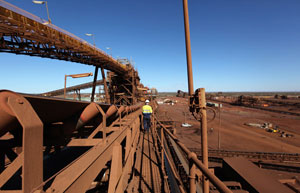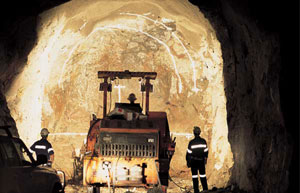Outbound mining M&As to rebound: Experts
By Du Juan (China Daily) Updated: 2014-02-19 08:52He said it's an opportune time for Chinese companies to acquire foreign assets because of falling commodity prices.
South said mining companies are hesitant to undertake transactions because of uncertainty about the forward curve of commodity prices.
Shareholders are also discouraging acquisitions.
"I suspect the M&A market will remain sluggish until there is greater clarity around future demand. The industry is going through one of those cycles that will drive people, in hindsight, to say that this was a good buying opportunity," he said.
"Companies that take advantage of this opportunity to go up the risk curve may find themselves rewarded over time."
Jeff Tao, partner of M&A transaction services with Deloitte, said the number of Chinese private mining companies that are interested in outbound M&A deals has been increasing.
"Plus, Chinese investors are shifting their overseas investment from traditional commodities such as iron ore and coal to diversified products including copper, gold and potash."
Affected by a weak global economy and slower domestic demand, the mining industry was squeezed last year by high costs, falling prices and low productivity.
Those challenges will persist this year, according to Deloitte.
Phil Hopwood, global mining leader with the firm, said while mining companies can't change global economic conditions, they can change the way they operate.
He said that mining companies need to adopt technologies that allow them to operate mines remotely, automate core mining processes and use techniques such as remote sensing to localize ore deposits.
Chinese miners rarely employ such innovations and concepts, said Liu.
From the technology perspective, there is a lot to learn for Chinese giants from global mining companies that are also striving to cut costs and improve production efficiency.
BHP Billiton Ltd, the world's biggest miner, announced on Tuesday a 31 percent rise in profits for its fiscal first half, which ended on Dec 31, as cost cuts offset lower commodity prices.
|
 |
 |
- NHTSA says finds no 'defect trend' in Tesla Model S sedans
- WTO rare earth ruling is unfair
- Amway says 2014 China sales may grow 8%
- President Xi in Europe: Forging deals, boosting business
- CNOOC releases 2013 sustainability report
- Local production by Chery Jaguar Land Rover this year
- Car lovers test their need for speed in BMW Mission 3
- China stocks close mixed Monday

















